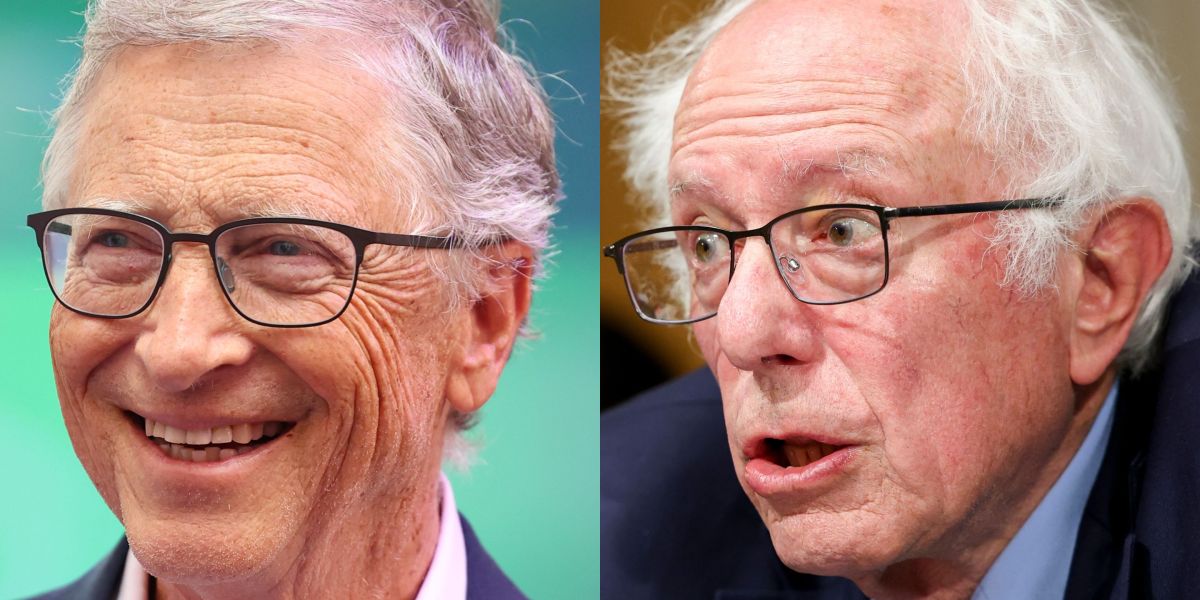That is why Microsoft co-founder and philanthropist Bill Gates—who is worth $162 billion according to the Bloomberg Billionaires Index—was surprised when the independent politician seemed keen to meet him.
Gates approached Sen. Sanders to film an episode for his new Netflix show ‘What’s Next? The Future with Bill Gates’, which aired this week.
Writing on his blog, GatesNotes, on Wednesday, the tech tycoon said when he emailed Sen. Sanders to request an interview about income inequality, he didn’t expect to hear back very promptly.
That’s because the 83-year-old politician disagrees wholeheartedly with Gates’s lifestyle.
In 2019 Sen. Sanders wrote on X, the platform previously known as Twitter: “There should be no billionaires.”
Sanders described the income disparity in the U.S. between the working class and billionaires as a “moral and economic outrage,” adding: “We cannot afford to continue this level of income and wealth inequality and we cannot afford a billionaire class.”
Gates wrote that this stance prompted his friends to “raise an eyebrow” when they heard about the pair’s meeting.
“This wasn’t my first time meeting the Senator,” Gates revealed this week. “In the past, I found him quite approachable. I knew that, on lots of issues, we see things the same way. We had talked briefly about the climate crisis, but we had never had a lengthy conversation—and certainly not about income inequality.”
This was exactly the topic of discussion.
Gates wrote: “Bernie asked me some hard questions about how much wealth I thought would be enough. We agreed that wealthy people should be taxed more.
“I asked him if he had any legislation ready to go to help make that a reality. It was a great discussion.”
Plans for taxing the super-rich
Sen. Sanders has a plan for how he would tax the likes of Gates.
This entails an annual 1% tax on a married couple’s net worth above $32 million. For example, a couple worth $32.5m would pay an annual tax of $5,000.
Under Sen. Sanders’s plan, this tax rate would increase to 2% for couples with a net worth of $50m to $250m, 3% from $250m to $500m and 4% from $500m to $1bn.
For the billionaire bracket, those with a net worth of between $2.5bn and $5bn would pay 6% tax over $32m, 7% between $5bn and $10bn, and 8% on wealth over $10bn.
These percentages are for married couples and would be halved for individuals.
Sen. Sanders has also proposed that the government should ban billionaires by confiscating any wealth above $1 billion.
In an interview with HBO Max’s Who’s Talking to Chris Wallace, the Vermont senator said last year: “You may disagree with me, but I think people can make it on $999 million,” Sanders added. “I think that they can survive just fine.”
Billionaires themselves also have proposals for how the super-rich should be taxed.
Berkshire Hathaway CEO Warren Buffett, for example, coined the ‘Buffett Rule’ after he repeatedly pointed out that he pays the same percentage share of income tax as his secretary Debbie Bosanek, inadvertently making her the face of tax inequality in the United States.
The issue arises from the fact that while Buffett, who has a net worth of $145 billion, per the Bloomberg Billionaires Index, pays a higher share of federal income tax, Bosanek pays a higher share of her income in Social Security taxes than Buffett does.
As a result, the Buffett Rule states that no household earning more than $1 million annually should pay a smaller share of its income than middle-class families.
It’s a take that JPMorgan CEO Jamie Dimon—also a billionaire himself—agrees with.
Dimon said last month he would reduce Uncle Sam’s $35 trillion national debt by taxing the rich more.
He told PBS News: “You would maybe just raise taxes a little bit. Like the Warren Buffett type of rule, I would do that.”
